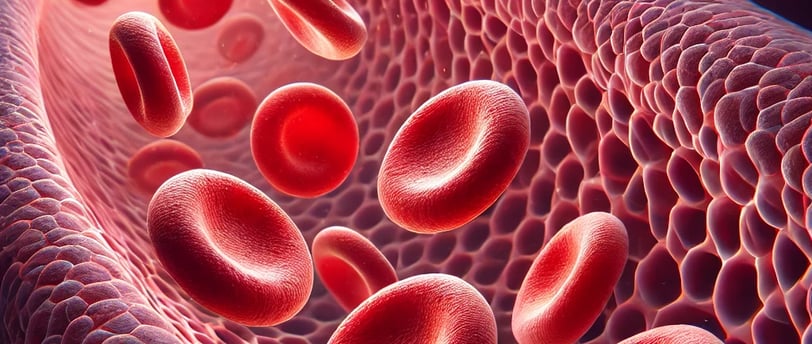Understanding Sickle Cell Syndrome: Causes, Symptoms, and Life-Saving Management
Sickle Cell Syndrome is a genetic condition that impacts millions worldwide, yet many remain unaware of its effects and management strategies. This comprehensive guide breaks down the key aspects of Sickle Cell Syndrome to help you understand its causes, recognize its symptoms, and explore treatment options.
HEMATOLOGY
Rishwin A R
1/16/20252 min read


What is Sickle Cell Syndrome?
Sickle Cell Syndrome, also known as Sickle Cell Disease (SCD), is a group of inherited blood disorders characterized by abnormal hemoglobin, called hemoglobin S. This condition affects the shape and function of red blood cells, leading to significant health challenges.
How Does It Affect the Body?
Normal red blood cells are round and flexible, allowing them to flow easily through blood vessels.
In SCD, red blood cells take on a sickle or crescent shape, making them sticky and rigid.
These abnormally shaped cells can block blood flow, causing pain and organ damage.
Causes of Sickle Cell Syndrome
Sickle Cell Syndrome is caused by a mutation in the HBB gene, which provides instructions for making hemoglobin. Here’s how it’s inherited:
Autosomal Recessive Pattern: A child must inherit two copies of the defective gene (one from each parent) to develop the disease.
Carriers (Sickle Cell Trait): Individuals with one defective gene typically do not show symptoms but can pass the gene to their children.
Symptoms of Sickle Cell Syndrome
The symptoms of Sickle Cell Syndrome can vary in severity and often begin in early childhood. Common signs include:
General Symptoms:
Anemia (fatigue, weakness, pale skin)
Delayed growth and puberty
Pain Episodes (Sickle Cell Crises):
Sudden, intense pain in the chest, joints, or abdomen
Can last from a few hours to several days
Other Complications:
Frequent infections
Vision problems due to damage to blood vessels in the eyes
Swelling in hands and feet
Diagnosis of Sickle Cell Syndrome
How is it Diagnosed?
Newborn Screening: Blood tests performed at birth can detect SCD early.
Hemoglobin Electrophoresis: This test identifies abnormal hemoglobin types.
Genetic Testing: Helps confirm the presence of the HBB gene mutation.
Treatment Options and Management
While there is no universal cure for Sickle Cell Syndrome, several treatments can manage symptoms and prevent complications:
Medications:
Hydroxyurea: Reduces the frequency of pain episodes and need for blood transfusions.
Penicillin: Prevents infections in young children.
Pain Relievers: Helps manage acute pain episodes.
Blood Transfusions:
Regular transfusions can lower the risk of stroke and improve anemia.
Bone Marrow Transplant:
The only potential cure for SCD, though it is not suitable for everyone.
Lifestyle Adjustments:
Stay hydrated to reduce the risk of sickle cell crises.
Avoid extreme temperatures to minimize stress on the body.
Regular exercise and balanced nutrition to maintain overall health.
Living with Sickle Cell Syndrome
Tips for Patients and Families:
Build a strong relationship with a healthcare provider for regular check-ups.
Join support groups to connect with others living with SCD.
Stay informed about new treatments and clinical trials.
Advocacy and Awareness:
Raising awareness about SCD can help improve funding for research and support for affected families.
Frequently Asked Questions
1. Is Sickle Cell Syndrome contagious?
No, it is a genetic condition and cannot be transmitted from person to person.
2. Can SCD be detected before birth?
Yes, prenatal genetic testing can determine if a baby is at risk for SCD.
3. How common is Sickle Cell Syndrome?
It affects approximately 1 in 365 African-American births and is also prevalent in people of Hispanic, Mediterranean, and Indian descent.
4. Can people with SCD live a normal life?
Yes, with proper management and medical care, many individuals lead fulfilling lives.
5. What advancements are being made in SCD treatment?
Gene therapy and new medications are promising areas of research offering hope for improved outcomes.
Syndromes.xyz
Explore medical syndromes and their details here.
For Educational purposes only
The information on this site is not in any way, replacement for professional advice. Always consult your physician regarding personal queries
Connect
Support
syndromesxyz@gmail.com
© 2024. All rights reserved.
